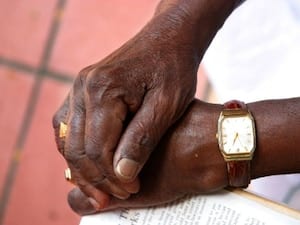
WEDNESDAY, Sept. 19, 2018 (HealthDay News) — Eczema, or atopic dermatitis, can be very difficult to control in some people.
But the skin condition, which leads to dry, itchy and inflamed skin, is particularly problematic for black people, according to new research.
Scientists who examined patients’ skin on a molecular level found that compared to Americans of European ancestry, African Americans may require higher doses of some medications to manage stubborn eczema symptoms.
“Research shows about 19 percent of African Americans and 16 percent of European Americans are diagnosed with atopic dermatitis,” said study lead author Dr. Emma Guttman-Yassky. She is a professor of dermatology at Icahn School of Medicine at Mount Sinai, in New York City.
“Our study found there are significant differences in the skin of people with atopic dermatitis than in those without the condition,” she added.
“Furthermore, we found African Americans with atopic dermatitis have more inflammation than European Americans with the condition,” Guttman-Yassky said in a news release from the American College of Allergy, Asthma and Immunology.
Scientists are using molecular skin profiling to develop more effective treatments for eczema. Previous research, however, had only included European Americans with the skin condition, the study authors explained.
So the new study compared the molecular profile of the skin in eczema patients of African descent with patients of European descent, looking for differences that might help researchers improve treatment options for black people.
“The results indicated that the immune profile was more unbalanced in African Americans with atopic dermatitis compared to European Americans,” Guttman-Yassky said.
The study authors said this was the first molecular study to seek out and identify differences that could help doctors understand why eczema is often more severe and difficult to control among black people.
The findings were published in the Sept. 14 issue of Annals of Allergy, Asthma and Immunology.
According to allergist Dr. Donald Leung, executive editor of the journal, “This may prove to be a valuable enhancement for treatment options for African Americans with atopic dermatitis. It will also reinforce the importance of racial diversity in clinical research studies for effective treatment” for the skin condition.
More information
The U.S. National Library of Medicine has more on eczema.
